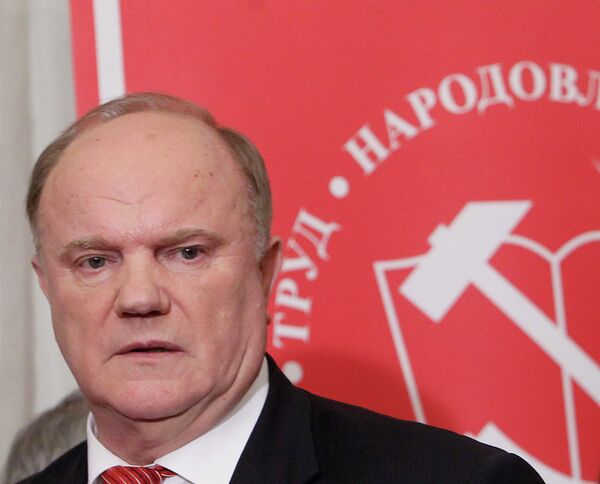MOSCOW, March 14 (Marc Bennetts, RIA Novosti) – The announcement of a report casting fresh doubt on the results of Russia’s 2011 parliamentary polls drew a dismissive response from the pro-Kremlin ruling party and the country’s top election official on Wednesday, while also causing a flurry of speculation about motives, as the study reportedly emerged from a think-tank headed by an official close to President Vladimir Putin.
“The officially announced results are unreliable. United Russia did not take first place,” Stepan Sulakshin, the author of the Moscow-based Governance and Problem Analysis Center’s report, told the RBK Daily newspaper in comments published late on Tuesday. “The Communist Party took first place.”
Sulakshin said the United Russia party had gained 20-25 percent of the vote at the 2011 State Duma polls, compared to the official figure of 49 percent, while the Communists had gained 25-30 percent, significantly more than the 19 percent announced by election officials.
Sulakshin could not be reached for comment on Wednesday. A spokesperson at the think-tank, where is he is director, said he was “on a business trip,” and no one else at the center could comment on the report, which has not been released to the public. The Kommersant newspaper said the report came out of a seminar that took place in the fall of 2012, and its findings were based on “mathematical” methods.
Widespread allegations of vote fraud in favor of then Prime Minister Putin’s United Russia party at the December 4, 2011 parliamentary elections triggered the largest anti-government demonstrations since the fall of the Soviet Union.
Unlikely Critic
The think-tank responsible for the potentially explosive report is run by an unlikely government critic: Russian Railways chief Vladimir Yakunin, an alleged former KGB officer widely seen as a member of Putin’s inner circle.
However, a source within Russian Railways told RIA Novosti on Wednesday that Yakunin had not been involved in the drawing-up of the report. The source was unable to say why news of the report had only been made public more than a year after the elections, but denied it was part of a rumored Kremlin plan to call snap parliamentary polls.
Russia’s respected Kommersant newspaper said earlier this year, citing United Russia sources, that the Kremlin could disband parliament - hit by a number of alleged corruption scandals involving lawmakers in recent months – in a bid to save Putin’s declining ratings.
Putin stepped down as head of United Russia last May, when he handed over stewardship of the party to Prime Minister Dmitry Medvedev. But commentators suggest he remains closely linked in the eyes of the public to the party, which was successfully branded “the party of crooks and thieves” by opposition figurehead Alexei Navalny.
An opinion survey released earlier this week by the IA Rex pollster found that that in a survey of 396 political analysts, 22.5 percent believed in the likelihood of early elections to the State Duma, while a similar proportion did not rule out the scenario.
Other political analysts suggested on Wednesday the report had been issued in a bid to differentiate Putin from United Russia in the eyes of the electorate.
“There are a group of zealous guys in that center who believe it is necessary to distance Putin from United Russia – to deflect everything negative onto the party,” respected political analyst Evgeniy Minchenko told Kommersant.
Lilia Shibanova, head of the independent election watchdog Golos, speculated the report could be part of what she dubbed “Kremlin games” that could see the creation of a new pro-Kremlin party to replace the increasingly discredited United Russia.
Political Reaction
“The data in the report have been plucked from thin air,” a senior United Russia official, Konstantin Mazurevsky, told RIA Novosti. “They don’t match the analytical data. Enough other elections have been held since then, including regional ones, whose results have answered any questions and disprove the report.”
The head of Russia’s Central Elections Commission, Vladimir Churov – dubbed “the wizard” by opposition figures after the 2011 polls over allegations he had conjured up an unlikely victory for United Russia – also hit out at the report, suggesting its author seek psychiatric assistance. Churov, an unabashed Kremlin loyalist, has frequently said: “Churov’s first law is – Putin’s always right.”
Reaction from the Communist Party was surprisingly muted. There was no reaction from veteran party head, Gennady Zyuganov. Calls to the party’s press office went unanswered as of late Wednesday afternoon.
Vadim Solovyev, the Communist Party’s top lawyer, told journalists the party had also estimated it took around 30 percent of the vote at the 2011 polls. He said the party had not contested the results in court because it did not believe its appeal would get a fair hearing.
The Kremlin has not officially commented on the news of the report, but an administration source told RIA Novosti that anyone dissatisfied with the election results should file complaints with the courts, and “not write reports.”
“The courts have frequently simply rejected complaints about the December 2011 polls,” noted Shibanova, the head of Golos.
Putin’s Victory ‘Legitimate’
The report apparently also examined Putin’s victory in presidential elections last March, which saw him return to the Kremlin for a controversial third term after a four-year hiatus as prime minister.
“Putin, unlike United Russia, is legitimate,” Sulakshin told RBK. “Fifty-two percent voted for him – zealous officials handed him another 13 percent.” Putin took 63.6 percent of the vote at last year’s polls, but Sulakshin did not explain the mathematical discrepancy.
“Putin needed an honest victory,” he added. “And so he gave the order to carry out honest elections.”
Anything over 50 percent of the vote at the March 2012 elections would have been enough to hand Putin victory in the first round.



